Pandemic Creates Needs, Forces New Solutions for United Caring Services
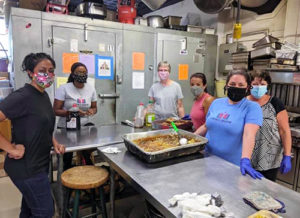
When the COVID-19 stay at home orders were issued in March, CHHSM member United Caring Services (UCS) knew it had to continue to help the local Evansville, Ind., community it serves. UCS provides emergency and essential services via its day shelter, men’s and women’s night shelters, medical respite, and apartments, and has not closed any of its programs during the pandemic, says Jason Emmerson, executive director. In fact, during March and April, UCS was the only low-barrier day shelter available to guests who needed to use the restroom, shower, use laundry, get a hot meal inside, and generally escape the elements.
“There were a few moments where we wondered if we could stay open, but with so many places closing, we knew we had to,” Emmerson says. “We knew it was our mission to serve, and that meant to stay open and do better than our best to keep everyone safe as we served.”
In late March, UCS wrote and tested new protocols, then tweaked and implemented them. The new protocols created more stringent requirements than earlier guidelines for dealing with health issues. The protocols are still in place and, according to Emmerson, are still vitally important in keeping staff, volunteers and guests safe.
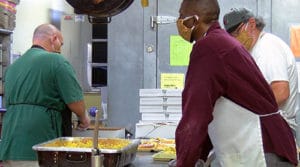
As part of the new procedures, everyone entering or leaving the night shelter and respite programs must have their temperature taken twice. Cleaning and disinfecting protocols have increased, and masks are required for all staff and volunteers, and for guests with symptoms. Emmerson says masks are encouraged for all guests, and are provided upon request, but are not required for asymptomatic guests. “We do not want to add a barrier” to accessing services, he says. “We want to offer dignity, respect, and safety to our guests which, at times, can be a balancing act when it comes to rules.” Additionally, guests who are symptomatic get into a local testing line to ensure they are COVID free.
Other protocols include enforced physical distancing. Staff removed 50 percent of the chairs, marked where people should stand while in line, and allow only 50 guests in at a time. Each meal time now has two sessions. “We started serving a little more food because there are times when we do not have seconds because we have two waves of people coming in to eat,” Emmerson says. “We stage it so that the first wave has some time to sit and eat. Then they leave, and the room is prepared for the second wave.”
UCS staff members have noticed additional anxiety caused by the pandemic, Emmerson says. “Imagine being homeless, with all the stressors and crises associated with that, and then adding COVID-19 to that,” he adds. “Some guests let it roll off, but generally speaking, the level of anxiety is higher for the people we serve.”
An unexpected factor that adds to the problems are non-homeless people who “get bent out of shape about masks, which trickles down to make the day-to-day lives of those who struggle even harder,” says Emmerson. To adequately serve the additional guests and their anxiety, UCS added a day shelter staff person on the weekends. All of the staff members, he adds, have been “heroic” in their willingness to serve.
Volunteers Come Through
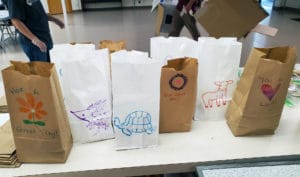
For example, in April and May, some 95 percent of UCS’ volunteers were not able to come to the shelters. Currently, about half of the volunteers are able to come to the shelters. Throughout the pandemic, staff and the guests themselves have pitched in to serve three meals a day to community members in need.
But although volunteers could not physically help out at the shelter, most — including all of the area UCC local churches — found ways to continue giving to UCS. For example, St. Peter’s Highland UCC made sack lunches — “a LOT of sack lunches,” says Emmerson — at the church and brought them to UCS several times. “They were easy to serve and clean up, given our limited help, and it really made a difference,” he adds.
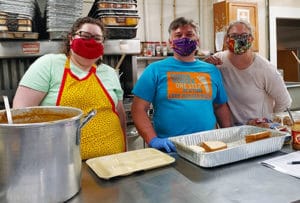
“Another successful day serving the guests at United Caring Services today,” reads a St. Peter’s Facebook post. “120 sack lunches prepared at church and transported to the shelter for distribution. Thanks to all who helped … and especially to all who decorated each lunch bag for us!”
St. Paul’s UCC and its director of youth and outreach ministries, Kimberly Armstrong, are long-time supporters who found a way to continue serving. Armstrong and her family showed up to help at the center and served meals — allowing an exhausted meal team to take a needed break.
Looking Ahead Toward Fuller Inclusion and Diversity
Although UCS recently was recognized as the top organization in servant leadership by Leadership Everyone, it is not content to just receive accolades. Emmerson says that additional needs identified during the pandemic will continue to be addressed once COVID-19 finally slows down. For example, although United Caring Services had planned to renovate the day shelter restroom and shower, that need has become more pressing since the lockdown.
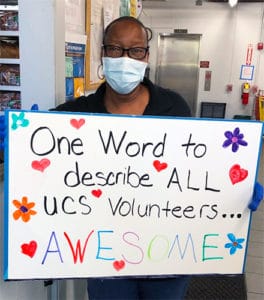
UCS is in the middle of raising $120,000 in grants, and an additional $40,000 via a capital campaign. Local UCC churches — including St Mark UCC, Bethel UCC, Bethlehem UCC, and Salem (Heusler) UCC — have already raise $20,000. “If we raise more than $40,000 — and we want to — then that will allow for greater contingency expenses for the project,” says Emmerson. “That means better equipment, and covers more if we do not receive the anticipated grant funding.”
Another key expansion is in medical respite. “UCS has the only medical respite in the area but it is unable to meet the demand to isolate or quarantine people at UCS or for the city, which we need to do,” Emmerson says. “In response to COVID, we are redesigning the men’s respite and shelter space to meet current and future needs. This will help guests stay healthy, be safe, able to rest, recuperate, and experience a positive stay.”
The new design will incorporate more individual respite rooms and a room in the men’s shelter for guests who work third shift to sleep longer. “We hope to use a flexible design system so we can actually add or move walls to expand or change the layout of the rooms as needed,” Emmerson says.
But Emmerson says responding to the pandemic also has caused UCS and its board to look more broadly at future needs. “We need to respond to immediate relief needs of the people we serve, but we also, simultaneously, need to look at who and how we are serving and make larger systemic changes to sustain all these added efforts,” he says. “We are in a new reality now, and we need to admit that, accept the challenge, and rise to the occasion.” Part of that work includes meeting with community partners to build a better system of service to assist people who are homeless.
As in the past, diversity and inclusion are two main emphases for UCS as it seeks “to be inclusive and diverse and a community of caring for all people,” Emmerson says. “To that end, we have really been focusing on our diversity and inclusion efforts to represent the people we serve and to educate and communicate with each other.”
Long before HUD required it, UCS already had diversity and inclusion statements and practices for staffing, volunteers and guest services that protect sexual orientation and gender identity across the full LGBTQ spectrum. But ongoing events have brought the need to address systemic racism into the forefront, and UCS’ diversity task force is responding. “We strive to truly be a community of caring for all people,” says Emmerson.
“We are intentionally seeking to ensure our community and outreach, board and committee members, volunteers, and staff training represents the people we serve, addresses important topics, and reinforces loving behavior,” he adds, “not only inviting others to UCS to learn about us, but to learn about other local efforts. Inclusion and education — it needs to be both ways.”
Join Our Mailing LIst
"*" indicates required fields
Follow on Facebook
Cedar Community and the West Bend Theatre Company Announce Partnership - CHHSM
www.chhsm.org
Cedar Community in West Bend, Wis., and the West Bend Theatre Company (WBTC) announce recently that they will continue their partnership in the 2025 season. Following a highly successful run of Char...